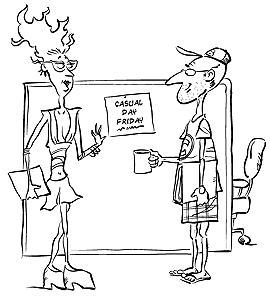This is admittedly a silly topic, and yet we keep talking about it, so it must matter.
 The December 2005 issue of the ABA Journal weighs in on the matter, and I recommend reading that article. Issues involved include questions such as: should you err on the side of caution and overdress? Or underdress? How do you pack for a business trip?
The December 2005 issue of the ABA Journal weighs in on the matter, and I recommend reading that article. Issues involved include questions such as: should you err on the side of caution and overdress? Or underdress? How do you pack for a business trip?Only a few short years ago it was easy to pack for a business trip: you took suits. And casual Friday was a brand-new phenomenon. But today most workplaces are business casual every day. This is, I believe, just another manifestation of our societal shift toward informality. It is an egalitarian and enormously positive development, and it means that the lack of a well-tailored suit is no longer a barrier to entry into the legal profession. That is a good thing.
In other words, I disagree with Mr. Ben Stein, who in the New York Times in August argued that today men dress like "total slobs," and that their casual dress (read: not coat and tie) adversely affects their professionalism. I myself regularly billed more than 2,000 productive hours a year in casual clothes. The pressure was no less great just because I was wearing khakis.
So who is right--Ben or me? For lawyers, the answer is easy: YOUR CLIENT IS RIGHT.
The cardinal rule of legal writing is that you write to your audience. If the judge does not like split infinitives, then do not use them in your brief. If your client wants e-mail and not hardcopy mail, then you oblige her. The same goes for the way you dress. It is no accident that business casual dress started on the West Coast, with its software and high-tech firms and their informal culture. To them, the lawyer in a suit was essentially saying, "I am not on board with your business vision or mindset," while the lawyer in the golf shirt was saying, "I get it. Hire me."
So if you have clients that do not care how you dress, then dress informally to suit your taste. If they do care, then dress to their culture. That of course requires you to know what their culture is, and you may need to ask at first. But once you know, then dress to it.
One final point: do not for a minute think that your "clients" are limited just to your actual clients. Smart junior associates always dress in a manner acceptable to their most important "client": THEIR EMPLOYER. The senior partner can make or break you; don't let it be over a ratty pair of pants and scuffed shoes.



4 comments:
I agree. And as a broader point, it is striking how many people use appearance as a proxy for other persons' characteristics or traits (e.g., work ethic, propensity to get in trouble with the law), even when those characteristics and traits have nothing to do with appearance. It seems to show how we compartmentalize our thinking: we look for proxies to help us manage all of the information we encounter, but unfortunately, those proxies often prove wrong and reflective of our stereotypes, and even worse, we often don't recognize when we employ proxies and we tend to think that we are not engaging in stereotypical thinking when in fact we are. I think that is why "business casual" irks a lot of people, but at the time, why they are unable to articulate why it irks them.
Jason Wojciechowski has an excellent point about what you should wear to an interview. As a job applicant, I never, ever, showed up for an interview in khakis--although as an attorney, I often did wear khakis when conducting interviews. I think this is consistent, really, with my overall theme--that you should dress to what the "client" (including firm) expects in a given situation. For job interviews, that's a suit.
As for class barriers, they're still there, alright. It's just that you can't always tell who is who based on clothes. Clothes are so much cheaper (and more informal) than at any time in the past that you don't always know who on the street is well-to-do and who is not.
Rusya
Çeçenistan
Halk Bilimi
Türk Sanatı
Hi. this is an informative post
forex guides
Post a Comment